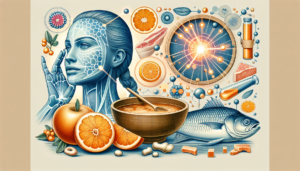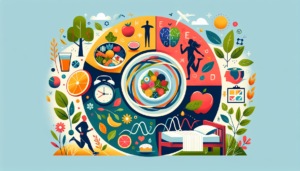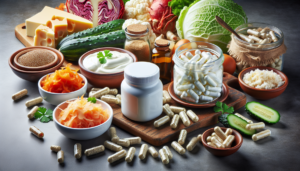Daily Vitamins for Athletes: Enhancing Performance Naturally
Understanding Daily Vitamins: The Basics
Vitamins are organic compounds that are crucial for maintaining good health. They assist in various bodily functions — from energy production to immune system regulation. There are two primary categories of vitamins: water-soluble and fat-soluble. Water-soluble vitamins include the B-complex group and vitamin C, while fat-soluble vitamins consist of vitamins A, D, E, and K.
For athletes, ensuring an adequate intake of vitamins is essential due to their demands for higher energy, recovery, and health maintenance. Deficiencies in key vitamins can lead to decreased performance, fatigue, and a higher risk of injury.
Importance of Daily Vitamins for Athletes
Optimizing Energy Production
Every athlete knows that energy output is crucial during training and competitions. B vitamins – particularly B1 (thiamine), B2 (riboflavin), B3 (niacin), B5 (pantothenic acid), B6 (pyridoxine), B7 (biotin), B9 (folate), and B12 (cobalamin) – are vital in energy metabolism. They assist in converting carbohydrates and fats into glucose, which fuels the body during physical exertion.
Enhancing Recovery
Vitamins play a significant role in recovery after intense exercise. Vitamins C and E are known antioxidants that combat oxidative stress induced by rigorous workouts. This oxidative stress can lead to muscle fatigue, soreness, and longer recovery times. Ensuring adequate intake of these vitamins helps to reduce inflammation and accelerate the healing process.
Supporting the Immune System
During periods of intense training, athletes can experience a suppression of their immune system, increasing the risk of illness. Vitamins A, C, D, and E are known to support immune health. Vitamin D, in particular, is crucial for immune system modulation and has been linked to reducing the incidence of respiratory infections among athletes.
Essential Vitamins for Athletic Performance
Vitamin A
Vitamin A is paramount for maintaining healthy vision, skin, and immune function. It also plays a role in cellular growth and repair. Athletes can benefit from vitamin A-rich foods like liver, carrots, sweet potatoes, and dark leafy greens.
B-Complex Vitamins
- B1 (Thiamine): Essential for converting carbohydrates into energy.
- B2 (Riboflavin): Important for energy production and antioxidant protection.
- B3 (Niacin): Aids in DNA repair and promotes healthy skin.
- B6 (Pyridoxine): Supports protein metabolism and energy production.
- B12 (Cobalamin): Crucial for red blood cell formation and overall cellular energy.
Foods rich in B vitamins include whole grains, eggs, dairy products, meat, and legumes.
Vitamin C
Known for its immune-boosting properties, vitamin C aids in collagen formation, which is vital for joint and tissue repair. It’s predominantly found in fruits like oranges, kiwis, strawberries, and vegetables like bell peppers and broccoli.
Vitamin D
Vitamin D not only helps in calcium absorption for bone health but is also linked to muscle function and immune response. The body produces vitamin D upon exposure to sunlight, making it crucial for athletes training outdoors. Foods rich in vitamin D include fatty fish, fortified dairy products, and egg yolks.
Vitamin E
An important antioxidant, vitamin E aids in protecting muscle cells from oxidative damage during intense training. It is commonly found in nuts, seeds, and green leafy vegetables.
Vitamin K
While often overlooked, vitamin K is vital for blood clotting and bone health. Athletes can get vitamin K from green leafy vegetables, such as kale and spinach.
Daily Vitamin Recommendations for Athletes
The recommended dietary allowances (RDAs) for vitamins vary based on factors such as age, gender, and activity level. Athletes typically require higher amounts due to increased energy expenditure and physical stress.
General Guidelines
- Vitamin A: 900 mcg for men, 700 mcg for women
- B Vitamins: Varies by specific vitamin; for example, B12 is 2.4 mcg for adults
- Vitamin C: 90 mg for men, 75 mg for women
- Vitamin D: 600 IU for adults, but athletes may benefit from higher doses
- Vitamin E: 15 mg for adults
- Vitamin K: 120 mcg for men, 90 mcg for women
Best Sources of Vitamins
Whole Foods
Prioritize whole, nutrient-dense foods over supplements. Fruits, vegetables, lean meats, legumes, nuts, and whole grains are rich in vitamins and also provide beneficial compounds like phytochemicals and fiber.
Supplements
While food should be the primary source of vitamins, some athletes may consider vitamin supplements if they struggle to meet their requirements through diet alone. Vitamin D, for example, can be challenging to obtain in sufficient amounts from food. Always consult with a healthcare provider or nutritionist before starting any supplementation regimen.
Timing Your Vitamin Intake
The timing of vitamin intake can also influence their effectiveness. For instance, fat-soluble vitamins (A, D, E, K) are best absorbed with meals containing fat. On the other hand, water-soluble vitamins can be consumed at any time but may be more beneficial when spread throughout the day, especially around training sessions.
Common Myths About Vitamins
"More is Better"
Many believe that taking excessive amounts of vitamins will enhance performance further. However, this can lead to toxicity, especially with fat-soluble vitamins, and may hinder performance rather than enhance it. Maintaining a balanced intake is key.
"All Supplements Are Equal"
Not all supplements are created equal, and the efficacy can vary based on the quality, form, and bioavailability of the vitamins. Whole foods provide a matrix of nutrients that work synergistically, whereas many supplements may not deliver the same benefits.
The Role of a Balanced Diet
While vitamins are crucial, they should not be considered a substitute for a balanced diet. A diet rich in macronutrients (carbohydrates, proteins, and fats) alongside vitamins will ensure optimal performance and recovery.
Athletes should focus on whole foods that provide a range of nutrients. Whole grains for sustained energy, lean proteins for muscle repair, and healthy fats for joint support are all foundational components of an athlete’s nutrition.
Hydration and Vitamins
Hydration is another critical factor that interacts with vitamin absorption. Water-soluble vitamins can be lost through sweat, necessitating adequate fluid intake. Electrolytes are also vital for athletes to ensure that water retention and balance are maintained.
Conclusion: A Holistic Approach
For athletes, optimizing performance involves looking beyond just training and recovery practices. It incorporates a lifestyle choice centered around nutrition. Focusing on a diet rich in essential vitamins offers a natural and effective means to improve athletic performance, enhance recovery, and support overall health. Always prioritize whole foods and consider working with a sports nutritionist to tailor a nutrient plan to meet specific athletic needs.
This approach enables athletes to harness the power of daily vitamins while maximizing their potential and setting themselves up for sustained success in their sport.








